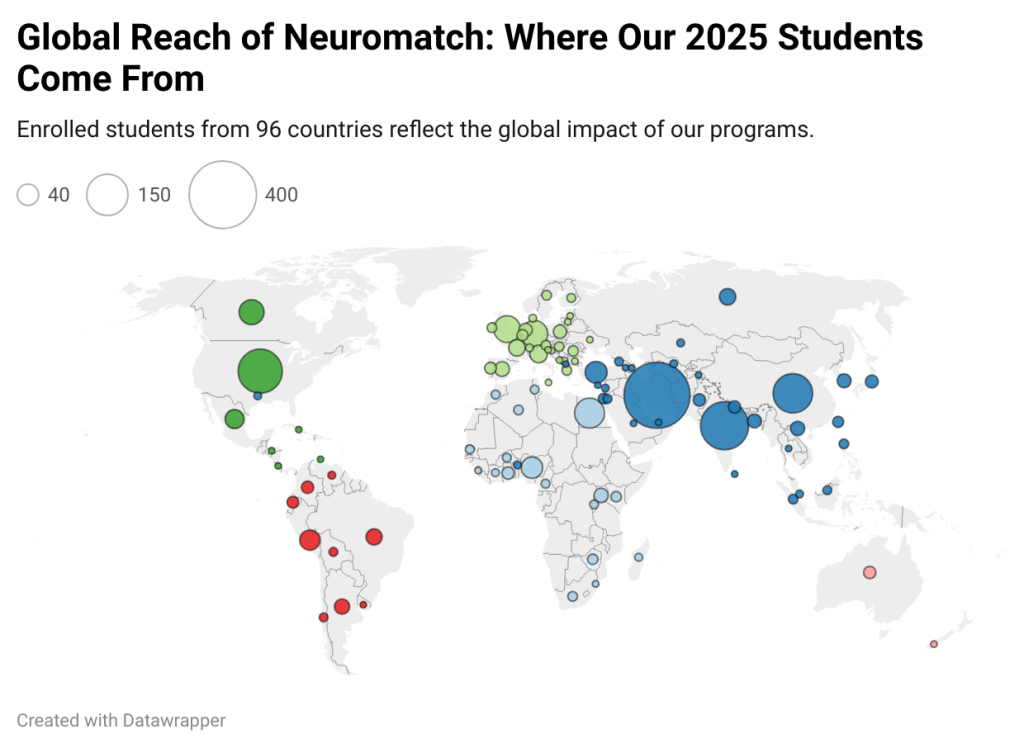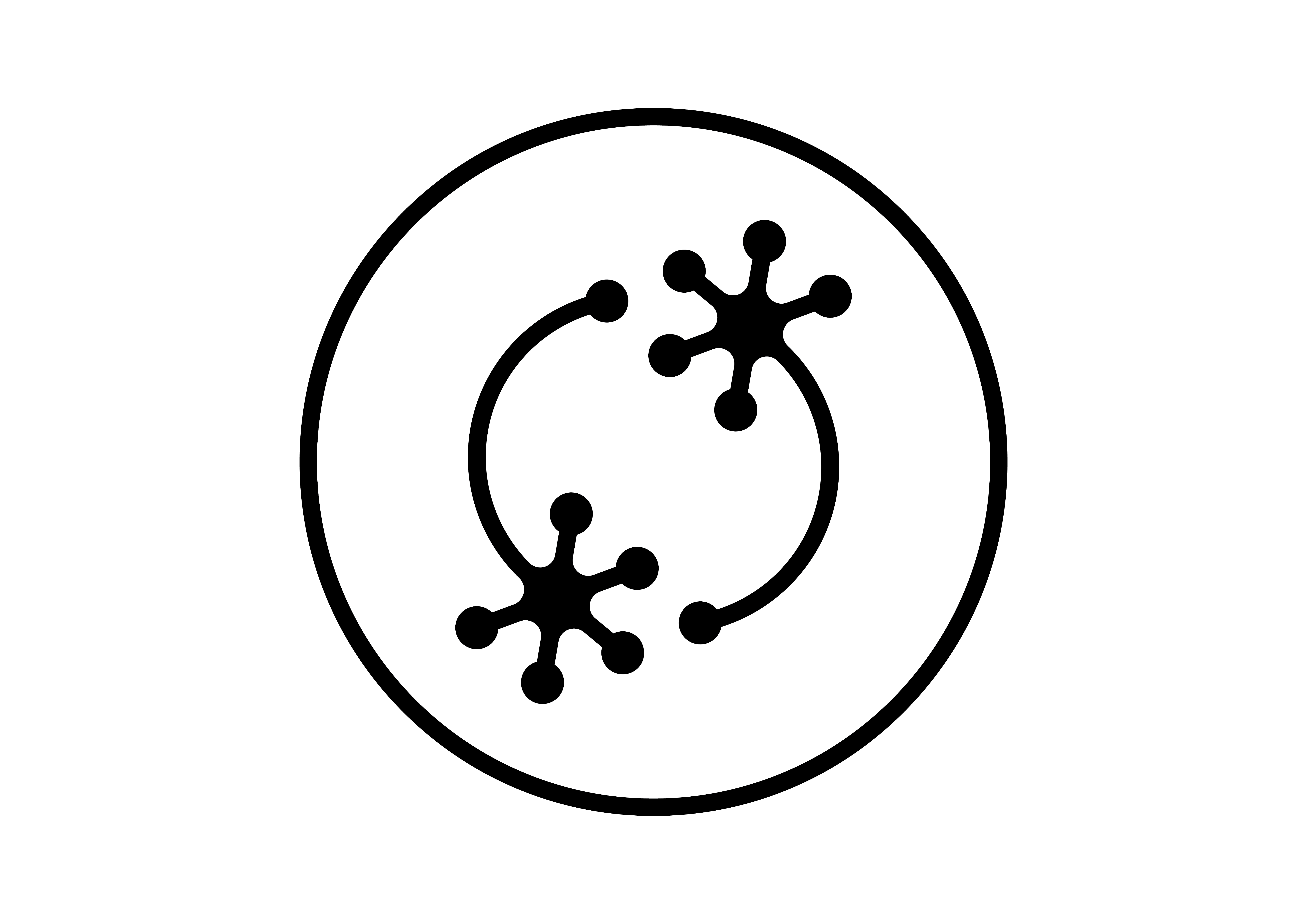During the Academy, students work in small groups to do a research project. They are provided a topic, an open-source dataset, and some guidance to get them started. Where they go from there and what questions they ask the data is completely up to them!
Students are supported by their TA, Project, TA, and you, a Project Mentor!
What does a Project Mentor do?
Project Mentor Role
- Project mentors should have experience with research and hold a PhD (or equivalent experience)
- Meet with a small group of students (4-7 students) several times over the course of the Academy
- 2-week courses, July 14-25: ~3, 30-minute meetings (1.5 hour total commitment)
- Climatematch: Computational Tools for Climate Science
- NeuroAI
- 3-week courses, July 7-25: ~5, 30-minute meetings (2.5 hours total commitment)
- During your meetings, you will learn about the students’ projects and help guide them through the ideation and implementation process. This may include:
- Forming a good research question that’s attainable in the course’s short timeframe
- Providing high-level advice and guidance on how to approach a research project
- Move students toward a conclusion to their project and advise on how to share their findings during their presentation
- Share your experience on research best practices
- As a project mentor, you can share your broader experience and general career advice with students as well
Why should you sign up as a Mentor?
As a project mentor, you’ll help spark curiosity, guide discovery, and have a profound influence on the careers of emerging researchers from around the world. This year, we have students enrolled from 96 countries, which shows our truly global community. Students often tell us that connecting with mentors is one of the most meaningful parts of their experience.
And mentorship is a two-way street! You may discover new collaborators, gain fresh perspectives, and build connections with peers across institutions and disciplines. You’ll also have the opportunity to network with researchers with similar research experience. We’ll highlight our mentors at the end of the program on our social media channels.
You will be matched with a student group according to your research interests. If you’re open to mentoring more than one group, even better; your impact will multiply! No preparation is needed; just your presence and perspective.
Benefits
- Have a global impact and make a lasting impact on someone’s career.
- Give back to the scientific community, passing on the knowledge and support you’ve received in your career.
- Expand your network by connecting with other professionals who are equally committed to fostering growth.

What’s expected?
Mentors will first choose which course they’d like to be a mentor for: Computational Neuroscience, Deep Learning, NeuroAI, or Computational Tools for Climate Science, and which project dataset you are comfortable supporting.
After your application is submitted:
- We will review your application and make sure you’re a good fit!
- You’ll receive an email letting you know you’ve been accepted, and we’ll work to match you with a project group.
- About a week before the course, you’ll receive an email letting you know which project group you’ll be mentoring.
- This email will include the project group’s Teaching Assistant, you’ll work with the TA to schedule a meeting during the first week of the course, during the project group’s dedicated project time.
- There are some cases when we have too many mentors! If we are not able to match you with a group, we will let you know and have you as a backup. There are always groups that need new mentors during the course.
- During the course!
- You’ll schedule a total of 3 meetings for a 2-week course and 5 meetings for a 3-week course. Each meeting should be about 30 minutes.
- You’ll work with the TA to schedule the first meeting, and then communicate directly with the project group to schedule the rest.
- All meetings take place during the project group’s project time, you can see when project time is for each time slot here.
- All meetings take place via Zoom.
- You’ll receive a link to join our Discord Server where you can chat with your project group directly. Please open a Support Ticket and let them know you’re a mentor and which project group you are working with.
How to sign up as a mentor
Sign up through the link below. You will be asked to provide information about your professional background, areas of expertise, and which courses your interested in being a mentor for.
Past Mentors
FAQs & Tips!
Tips for being a mentor
- Set clear expectations to ensure that you and your mentees are aligned and working towards common goals.
- Practice active listening and show genuine interest in your mentee’s perspectives.
- Provide constructive feedback and frame it in a way that encourages growth and learning, rather than discouragement.
- Encourage self-reflection.
- Share your experience. Share both successes and failures to provide a realistic perspective on the path ahead.
- Maintain professionalism and ethics in your interactions
How many students will be assigned to each mentor?
Every mentor will be assigned to a Project Group (~6-9 students).
I’m a student, how can I make the most out of my mentoring experience?
- Enthusiasm to the max: mentoring is a great opportunity to have someone with more professional and academic experience advise you on your journey. It is a learning and networking opportunity, at which you may find someone to look up to, to collaborate with or just from which to draw off more passion to follow your own path.
- Be sincere to yourself and to your mentor: it is best to have expectations clear and refined. Your first session might initiate with getting to know each other, where you are at the moment and where you want to get in the mid and long run. In the session, each one should make clear what they expect, reshape those expectations to be realistic and useful, and find a dynamic that benefits all parts.
- Self-knowledge: you are not expected to know everything about your professional interests, but rather it is important for you to have a clear picture of where you are at the moment, and maybe a rough idea of what you want to achieve. Being conscious of your current state will help you get the best advice possible for you.
- Keep a respectful and warm tone to the conversation: even though it has a professional tone to it, mentoring is, in essence, a social interaction. You may construct a long-lasting relationship with either your mentor or your peers (or both!). Thus, be kind and have fun, as you’ll be discussing your dreams and career goals, as well as the efforts you’ve made so far to follow them.
- Some planification: on one hand, you might want to have a rough drawing of what you might want to talk about during your mentoring sessions. It could range between your worries on how to apply to grad school, lab experience, and finding collaboration opportunities, among other things. This will facilitate you having a base from which to talk to, rather than trying to come up with something on site.
- Flexibility is key: on the other hand, planning beforehand shouldn’t mean wanting to follow everything you imagined. Depending on the dynamics in the mentoring room, you might not be able to talk about everything you wanted to, or you might’ve talked about things you didn’t even consider before. Feeling like you’re being pushed out of your comfort zone might be a common thought during those sessions, so it might be best to adapt and maximize your learning out of it.
- Own your actions: a mentor is there to help you find some insight, but not to solve the problems you presented yourself. In some cases, help might come as just verbal advice. In other cases, they might give you resources (books, links to institutes or emails of peers whom to contact). But in the end, you must take action based on this advice, your interests and capabilities. If you have doubts about the actions you have to take, that might also be a topic of discussion with your mentor.
- Notes, work and repeat: during or after your mentoring session, you might want to write some notes down on what was said that will be of interest. After that, try to make changes that correspond to the advice that was given to you, so that when you meet up again with your mentor, you can provide some advances to them.
